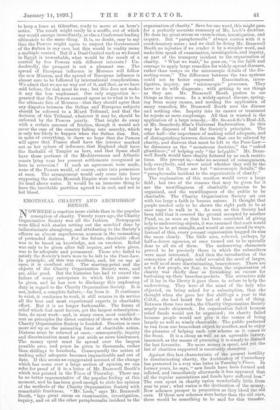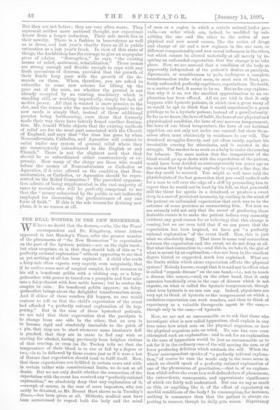EMOTIONAL CHARITY AND ARCHBISHOP BENSON. N OWHERE is reaction more visible
than in the popular conception of charity. Twenty years ago, the Charity Organisation Society was all the fashion. Newspapers were filled with stories setting out the mischief done by indiscriminate almsgiving, and attributing to the Society's officers an almost superhuman acumen in the unmasking of pretended distress. For the future, charitable effort was to be based on knowledge, not on emotion. Relief was only to be given after full inquiry, and when given, was to be adequate and permanent. Those who failed to satisfy the Society's tests were to be left to the Poor-Law. In principle, all this was excellent, and, let us say at once, it is excellent still. The starting-point and the objects of the Charity Organisation Society were, and are, alike good. But the historian has had to record the failure of many enterprises to which this praise can be given, and he has now to discharge this unpleasing duty in regard to the Charity Organisation Society. It is not, indeed, a complete failure,—far from it. It continues to exist, it continues to work, it still retains in its service all the best and most experienced experts in charitable effort. But it is no longer fashionable. The forms of relief which find most favour, get the largest subscription. lists, do most work—and, in many cases, most mischief— rest on principles the direct contrary of those on which the Charity organisation Society is founded. Emotion is once more set up as the animating force of charitable action. Distress must be relieved at once,—consequently, inquiry and discrimination must be put aside as mere hindrances. The money spent must be spread over the largest possible area, and pence be given to thousands, rather than shillings to hundreds, Consequently the notion of making relief adequate becomes impracticable and out of date. If this seems an exaggerated account of the change which has come over a large section of opinion, we can refer for proof of it to a letter of Mr. Bramwell Booth's which was printed in the Times of Thursday. There can be no better representative of the popular feeling at this moment, and he has been good enough to state his opinion of the methods of the Charity Organisation Society with remarkable frankness. "Mr. Loch," says Mr. Bramwell Booth, "lays great stress on examination, investigation, inquiry, and on all the other paraphernalia incident to the' organisation of charity." Save for one word, this might pass for a perfectly accurate summary of Mr. Loch's doctrine. He does lay great stress on examination, investigation, and inquiry. But " paraphernalia " always carries with it a. condemnatory sense ; and we shall be doing Mr. Bramwell Booth no injustice if we render it by a simpler word, and make him speak of examination, investigation, and inquiry, as part of the trumpery incident to the organisation of charity. "What we want," he goes on," is the faith and courage to apply large remedies for widely-spread diseases, rather than essays on the microscopic details of the dis- secting-room." The difference between the two systems could not be better expressed. Examination, inves- tigation, inquiry, are "microscopic" processes. They have to do with diagnosis ; with getting to see things as they are. Mr. Bramwell Booth prefers to see things as they seem. In a widely-spread disease, spring- ing from many causes, and needing the application of many remedies, Mr. Bramwell Booth sees the disease and nothing else. Inquiry into its causes or treatment he rejects as mere suiplusage. All that is wanted is the application of a large remedy,—Mr. So-and-So's Heal-All, or Mr. Somebody-Else's Universal Embrocation. In this way he disposes of half the Society's principles, The other half—the importance of making relief adequate, and of distinguishing between distress that can be relieved by charity, and distress that must be left to the Poor-Law- he dismisses as the "monstrous doctrine," the "naked ghastliness," of helping only "the helpable." Mr. Bram- well Booth would have charity fettered by no such restric- tions. His precept is,—take no account of consequences, help everybody, and never mind whether they will be the better for it. These are but "microscopic details," the "paraphernalia incident to the organisation of charIty." The explanation of this reaction would cover a, large field ; but two of the reasons that may be given for it are the unwillingness of charitable agencies to be organised, and the unwillingness of the public to be charitable. The Charity Organisation Society set out with too large a faith in human nature. It thought that people needed only to be shown the right path to be at once eager to walk in it. As soon as this Society had been told that it covered the ground occupied by another Fund, or, as soon as that had been convicted of giving help to undeserving objects, it was assumed that each would rejoice to be set straight, and would at once mend its ways. Instead of this, every peccant organisation hugged its sins the more closely. The little area, ralieved, perhaps, by half-a-dozen agencies, at once turned out to be specially dear to all six of them. The undeserving characters proved to be precisely those in which the subscribers were most interested. And then the introduction of the conception of adequate relief revealed the need of larger, as well as of more discriminating, benevolence. There are not a few people, we fear, to whom the organisation of charity was chiefly dear as furnishing an excuse for buttoning up their breeches-pockets. The attractive side of it lay in the liberty it gave them to refuse to help the undeserving. They were of the mind of the lady who objected, on being asked for a subscription, that she thought when she gave her five shillings a year to the C.O.S., she had heard the last of that sort of thing. Between these two rocks, the Charity Organisation Society nearly made shipwreck. Its organisation failed because relief funds would not be organised ; its charity failed because people would not give it the means of being largely as well as wisely charitable. The public preferred to run from one benevolent object to another, and to enjoy the pleasure of helping each new scheme as it comes to the front. It is a cheap as well as an agreeable luxury, inasmuch as the means of procuring it is simply to discard the last favourite. No more money is spent, and yet the list of charities supported is constantly changing. Against this last characteristic of the present hostility to discriminating charity, the Archbishop of Canterbury has protested in a very wise letter in Tuesday's Times. In former years, he says, "new funds have been formed and inflated, and immediately afterwards it has appeared that all the regular associations and. funds have suffered loss." The sum spent in charity varies wonderfully little from year to year ; what varies is the destination of the money. New schemes prosper in proportion as they bleed the old ones. If those new schemes were better than the old ones. there would be something to be said for this transfer. But they are not better ; they are very often worse. They represent neither more matured thought, nor experience drawn from a larger induction. Their sole merit lies in their novelty. There is a fashion in benevolence as well as in dress, and last year's charity fares as ill in public estimation as a last year's frock. In view of this state of things, the Archbishop has the courage to give an unpopular piece of advice. "Strengthen," he says, "the existing means of relief, assistance, rehabilitation." These means are strong enough and flexible enough to cope with any fresh accessions of distress, provided that the growth of their funds keep pace with the growth of the de- mands on them. When, therefore, you are asked to subscribe to some new scheme for lifting up the poor out of the mire, see whether the ground is not already occupied by an existing machinery which is standing still, or working imperfectly, simply for lack of motive power. All that is wanted is more pennies in the slot, and the reason why the machine.is inadequate to the new needs is simply that, instead of these additional pennies being forthcoming, even those that formerly made their way there have latterly found another destina- tion. Mr. Arnold White objects that the existing methods of relief are for the most part associated with the Church of England, and says that "the time has gone by when Nonconformists, Catholics, and Agnostics will consent to enlist under any system of general relief where they aye constructively subordinated to the English or any Church." There is not the slightest need that they should be so subordinated either constructively or ex- pressly. How many of the clergy are there who would refuse the money of Nonconformists or Catholics or Agnostics, if it were offered on the condition that Non- conformists, or Catholics, or Agnostics should be repre- sented on the Relief Committee ri The parochial organisa- tion admits of being supplemented in the vast majority of cases by recruits who will be perfectly competent to see that the "money subscribed by the public is not indirectly employed for increasing the predominance of any one form of faith." If this is the sole reason for devising new plans, it is no reason at all.



































 Previous page
Previous page